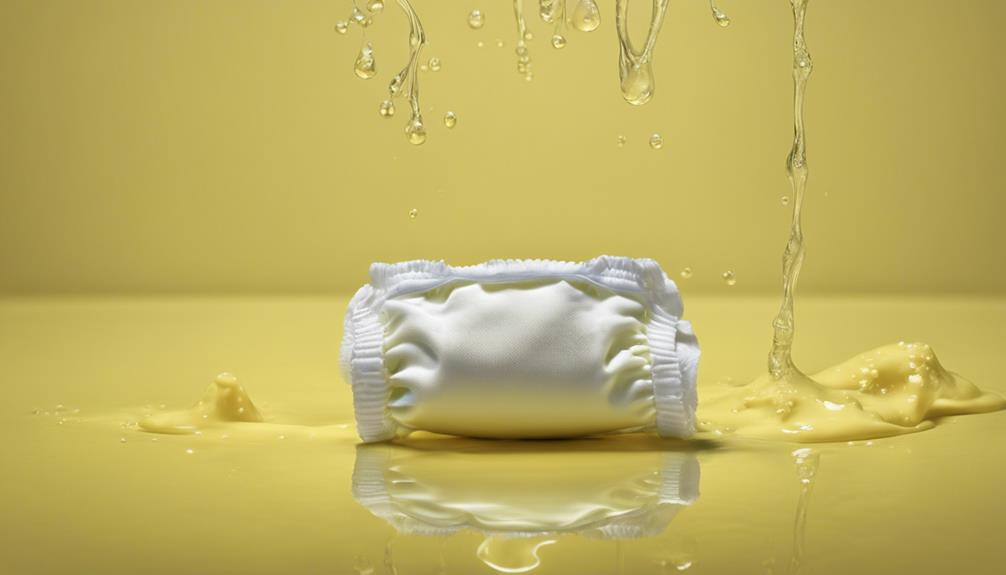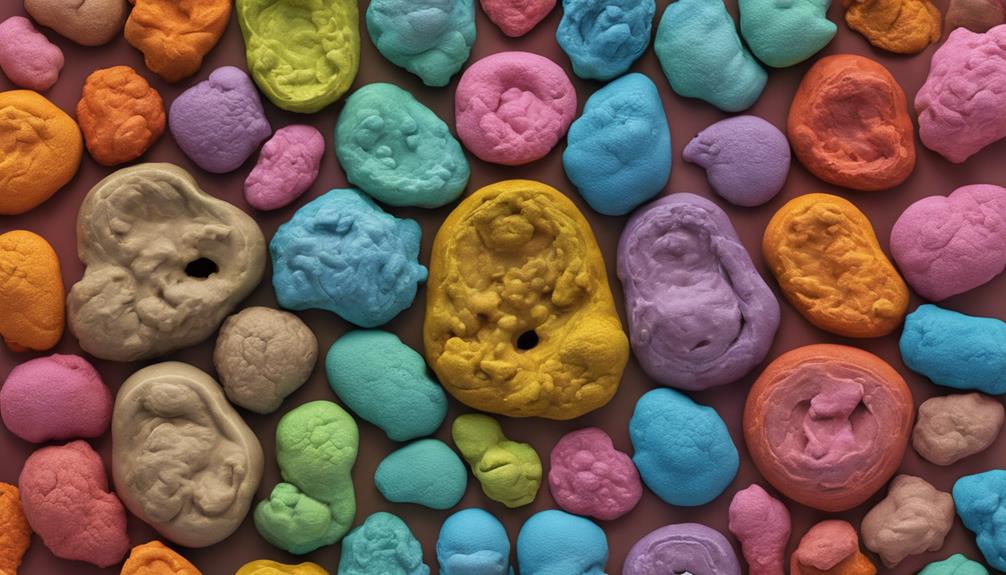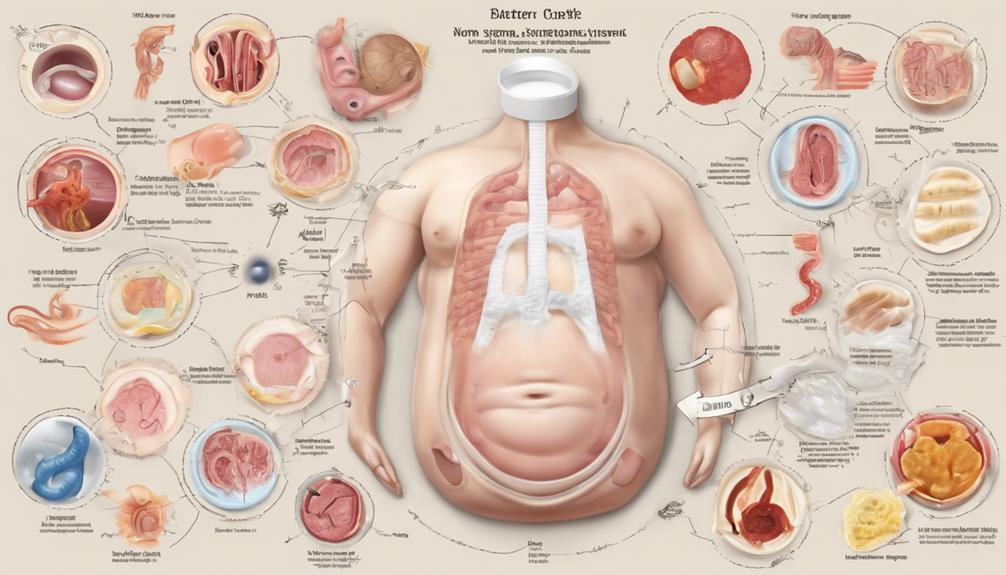When pondering newborn poop, pinpointing watery yellow stools is vital for parental peace of mind. Understanding what causes this change in stool color and consistency can be a critical step in ensuring your infant's well-being.
However, deciphering the signs and knowing when to take action is where the real challenge lies. Let's explore the intricacies of this topic further to shed light on how best to navigate this common yet concerning issue for new parents everywhere.
Key Takeaways
- Watery yellow stools in newborns signal potential issues like infections or allergies.
- Promptly address persistent watery stools to prevent dehydration complications.
- Monitor hydration, seek medical advice if symptoms last over 24 hours.
- Proper management through fluid intake and professional evaluation is crucial for newborn health.
Normal Vs Abnormal Newborn Poop
When differentiating between normal and abnormal newborn poop, it's important to observe the color, texture, and consistency of the stool to identify any potential issues promptly. Normal newborn poop typically appears mustard yellow, soft, and seedy in texture, reflecting a healthy digestive system. On the other hand, abnormal poop in a newborn may present as watery stools, which could be a sign of diarrhea. Diarrhea in newborns can lead to dehydration and other complications if not addressed promptly.
Understanding the distinction between normal and abnormal newborn poop is essential for early detection of any underlying issues. Proper hygiene practices, such as frequent diaper changes and gentle cleaning, can help maintain a healthy environment for the baby. It's also essential to monitor feeding habits and seek medical advice if there are concerns about the baby's poop. By staying vigilant and proactive in monitoring newborn poop, caregivers can ensure the baby's well-being and address any potential problems efficiently.
Identifying Watery Yellow Stools

Upon noticing watery yellow stools in a newborn's poop, it is important to contemplate potential causes such as infections, allergies, or medication reactions. Monitoring the frequency and consistency of these watery yellow stools is crucial to evaluate the baby's health. If the watery yellow stools persist, consulting a healthcare provider is essential for proper assessment and management. In cases of diarrhea with watery yellow stools, dehydration can pose a significant risk to newborns if not addressed promptly. Treatment may involve dietary adjustments, oral rehydration solutions, and medical interventions if necessary.
| Signs of Watery Yellow Stools in Newborn Poop |
|---|
| Color: Yellow, possibly watery |
| Frequency: Increased compared to usual |
| Consistency: Runny, loose texture |
Observing these characteristics in the newborn's poop can help in identifying potential issues and guiding discussions with a healthcare provider. Remember, early intervention and seeking professional advice are crucial in ensuring the baby's well-being.
Causes of Watery Stools in Newborns
In newborns, watery stools can be attributed to various factors such as infections, allergies, dietary triggers, or medication reactions. Infections like Rotavirus or Salmonella can lead to watery yellow stools in newborns. Diarrhea in newborns may also be caused by allergies or sensitivities to certain foods, resulting in loose stools.
Introducing excessive fruit juice or certain medications into a newborn's diet can trigger watery stools as well. Poor hygiene practices, contaminated food, or unclean water sources can introduce germs that cause diarrhea in newborns. It's important to monitor newborns with watery stools as this can lead to dehydration, necessitating prompt attention and management to prevent complications.
Understanding the potential causes of watery stools in newborns can help caregivers take appropriate steps to address the issue promptly and ensure the well-being of the infant.
When to Seek Medical Advice
Monitoring your newborn's watery yellow stools is important, and if these symptoms persist for more than 24 hours, seeking medical advice is recommended to guarantee prompt evaluation and appropriate management.
Here are three vital signs indicating when to seek medical advice:
- Signs of Dehydration: If your newborn's yellow stools are accompanied by signs of dehydration such as dry mouth, decreased tear production, or reduced urine output, it's essential to contact a healthcare provider promptly.
- Persistent Symptoms: Medical advice is warranted if the watery yellow stools are frequent and don't improve with feeding adjustments. This persistence may indicate an underlying issue that requires professional evaluation.
- Healthcare Provider Consultation: Consult a healthcare professional if your newborn's watery yellow stools persist beyond 24 hours. They can help determine the cause and provide appropriate treatment if necessary. Remember, early intervention is key to ensuring your newborn's health and well-being.
Managing Watery Yellow Stools
To effectively manage watery yellow stools in newborns, it's important to prioritize increasing fluid intake with breast milk or formula to prevent dehydration. Hydration is essential to replenish the fluids lost through diarrhea.
Breast milk or formula provides essential nutrients and helps maintain electrolyte balance. In cases of severe dehydration, oral rehydration solutions can be beneficial to restore electrolytes.
Monitoring the frequency and consistency of watery yellow stools is essential in tracking the progress of diarrhea. If watery yellow stools persist for more than 24 hours or if signs of dehydration such as dry mouth, decreased urine output, or lethargy are observed in newborns, seeking medical advice promptly is recommended.
Frequently Asked Questions
Is Watery Yellow Poop Normal for Newborns?
Watery yellow poop is normal for newborns. It indicates healthy digestion, common in breastfed babies due to breast milk breakdown. This color comes from bilirubin in the liver. Frequent yellow stools show a well-functioning system.
How Do I Know if My Newborn Has Diarrhea?
We keep a close eye on newborns for signs of diarrhea. Watery yellow stools could be a clue. If it's persistent or changes, we consult a healthcare provider for guidance. Dehydration is a real risk; early detection is key.
What Are the Symptoms of Yellow Liquid Stool?
We notice yellow liquid stool in newborns, a common sign of healthy breastfed baby poop. It's typically loose, seedy, and varies in shades of yellow due to bilirubin. This color indicates proper nutrient absorption from breast milk.
What Does Bile in Baby Poop Look Like?
Bile in baby poop appears as a yellowish color, a sign of healthy digestion and nutrient absorption. It helps break down fats in the diet, leading to the characteristic yellow hue in newborn stools.
Conclusion
To sum up, identifying watery yellow stools in newborns is essential for monitoring their health. Remember, babies can't always tell us when something is wrong, so it's up to us as caregivers to pay close attention.
If you notice persistent watery yellow stools, don't hesitate to seek medical advice. Remember, a stitch in time saves nine, and early intervention can prevent complications.
Stay vigilant, stay informed, and keep your little one healthy and happy.










